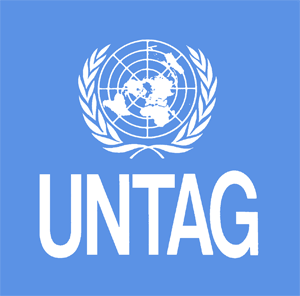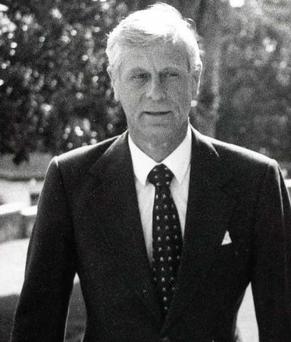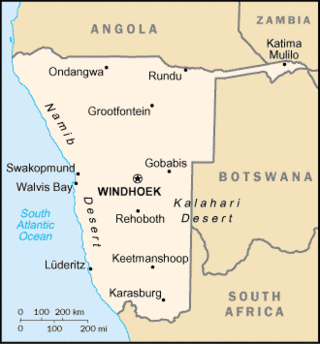
The United Nations Mission for the Referendum in Western Sahara is the United Nations peacekeeping mission in Western Sahara, established in 1991 under United Nations Security Council Resolution 690 as part of the Settlement Plan, which had paved way for a cease-fire in the conflict between Morocco and the Polisario Front over the contested territory of Western Sahara.

The United Nations Transition Assistance Group (UNTAG) was a United Nations (UN) peacekeeping force deployed from April 1989 to March 1990 in Namibia, known at the time as South West Africa, to monitor the peace process and elections there. Namibia had been occupied by South Africa since 1915, first under a League of Nations mandate and later illegally. Since 1966, South African forces had been combating an insurgency by the People's Liberation Army of Namibia (PLAN), the military wing of the Namibian-nationalist South West African People's Organization (SWAPO). The UN Security Council passed Resolution 435 in 1978, which set out a plan for elections administered by South Africa but under UN supervision and control after a ceasefire. However, only in 1988 were the two parties able to agree to a ceasefire. As UNTAG began to deploy peacekeepers, military observers, police, and political workers, hostilities were briefly renewed on the day the transition process was supposed to begin. After a new round of negotiations, a second date was set and the elections process began in earnest. Elections for the constitutional assembly took place in November 1989. They were peaceful and declared free and fair; SWAPO won a majority of the seats. The new constitution was adopted four months later and it was followed by Namibia's official independence and the successful conclusion of UNTAG.
United Nations Security Council Resolution 180, adopted on July 31, 1963, affirmed that Portugal claiming its overseas territories as part of metropolitan Portugal was contrary to the principles of the Charter. The Council deemed Portugal's actions and attitude as seriously disturbing to peace and security in Africa.

Louis Alexander Pienaar was a South African lawyer and diplomat. He was the last white Administrator of South-West Africa, from 1985 through Namibian independence in 1990. Pienaar later served as a minister in F W de Klerk's government until 1993. He married Isabel Maud van Niekerk on 11 December 1954.

United Nations Commissioner for South West Africa was a post created by the United Nations General Assembly (UNGA) in 1966 to assert the UN's direct responsibility for South West Africa which was then under illegal occupation by apartheid South Africa.

United Nations Security Council Resolution 435, adopted on September 29, 1978, put forward proposals for a cease-fire and UN-supervised elections in South African-controlled South West Africa which ultimately led to the independence of Namibia. Importantly, it established the United Nations Transition Assistance Group (UNTAG) which oversaw the election and the South African withdrawal.
United Nations Security Council Resolution 302, adopted on November 24, 1971, after reaffirming previous resolutions on the topic, the Council expressed its appreciation for the work accomplished by the Special Mission established in resolution 294. The Council deplored the lack of co-operation with the Special Mission by the Portuguese and called upon its government to take effective measures so that the territorial integrity of Senegal would be respected and to prevent acts of violence and destruction against the territory and its people.
United Nations Security Council Resolution 309, adopted on February 4, 1972, after reaffirming previous resolutions on the topic, the Council invited the Secretary-General, in close co-operation in a group of the Council composed of representatives of Argentina, Somalia and Yugoslavia, to initiate as soon as possible contacts with all parties concerned to enable the people of Namibia to exercise their right to self-determination and independence. The Council called upon South Africa to co-operate and requested the Secretary-General to report back no later that July 31, 1972.
The 1978 Settlement Proposal in Namibia, devised by the Contact Group of Western States, mandated the United Nations Transition Assistance Group (UNTAG) under United Nations Security Council Resolution 435 to assist a UN Special Representative appointed by the UN Secretary-General 'to ensure the early independence of Namibia through free and fair elections under the supervision and control of the United Nations'.

United Nations Security Council Resolution 393, adopted on July 30, 1976, after a letter from a representative from Zambia, the Council condemned a recent attack by South Africa in Zambian territory, resulting in the destruction of property and loss of life. The resolution went on to express concern at South Africa's occupation and use of South West Africa as a base for attacking neighbouring African countries, and that the continuation of this would constitute a threat to international peace and security.

United Nations Security Council Resolution 431, adopted on July 27, 1978, after recalling resolution 385 (1976), the Council took note of a proposal of a solution to the situation in Namibia and asked the Secretary-General to appoint a Special Representative for Namibia to ensure the independence of Namibia from South Africa as soon as possible. It also called on all concerned to exert their best efforts to resolve the issue, so that free and fair elections could be held.

United Nations Security Council resolution 475, adopted on 27 June 1980, after hearing representations from the People's Republic of Angola, the Council recalled resolutions 387 (1976), 447 (1979) and 454 (1979), and expressed its concern and condemned the continuing attacks on the country by South Africa through occupied South West Africa.

United Nations Security Council Resolution 545 was adopted on 20 December 1983; after hearing representations from the People's Republic of Angola, the Council recalled resolutions 387 (1976), 428 (1978), 447 (1979), 454 (1979) and 475 (1980), and expressed its concern at the continuing attacks on the country by South Africa through occupied South West Africa.

United Nations Security Council resolution 546, adopted on 6 January 1984, after hearing representations from the People's Republic of Angola, the council recalled resolutions 387 (1976), 428 (1978), 447 (1979), 454 (1979), 475 (1980) and 545 (1983), and expressed its concern at the continuing attacks on the country by South Africa through occupied South West Africa.

United Nations Security Council resolution 566, adopted on 19 June 1985, after recalling resolutions 269 (1969), 276 (1970), 301 (1971), 385 (1976), 431 (1978), 432 (1978), 435 (1978), 439 (1978), 532 (1983) and 539 (1983), the Council expressed concern at the tension and instability caused the continued occupation of Namibia by South Africa, noting the apartheid policies implemented in the territory and that the territory was used as a springboard for attacks on other southern African countries.

United Nations Security Council resolution 574, adopted unanimously on 7 October 1985, after hearing representations from the People's Republic of Angola, the Council recalled resolutions 387 (1976), 418 (1977), 428 (1978), 447 (1979), 454 (1979), 475 (1980), 545 (1983), 546 (1984), 567 (1985) and 571 (1985), and expressed its concern at the continuing attacks on the country by South Africa through occupied South West Africa.

United Nations Security Council resolution 632, adopted unanimously on 16 February 1989, after reaffirming resolutions 431 (1978), 435 (1978) and 629 (1989), the Council endorsed a report by the Secretary-General Javier Pérez de Cuéllar concerning the United Nations plan for Namibia, reiterating its legal authority over the territory until its independence.

United Nations Security Council resolution 643, adopted unanimously on 31 October 1989, after reaffirming resolutions 435 (1978) and 629 (1989), 632 (1989) and 640 (1989), as well as noting a report by the Secretary-General Javier Pérez de Cuéllar, the council expressed its full intention to implement Resolution 435 of 29 September 1978 regarding the situation in Namibia.

United Nations Security Council resolution 1301, adopted on 31 May 2000, after recalling all previous resolutions on the question of the Western Sahara, in particular resolutions 1108 (1997) and 1292 (2000), the Council extended the mandate of the United Nations Mission for the Referendum in Western Sahara (MINURSO) until 31 July 2000.
United Nations Security Council Resolution 1783 was unanimously adopted on 31 October 2007.







